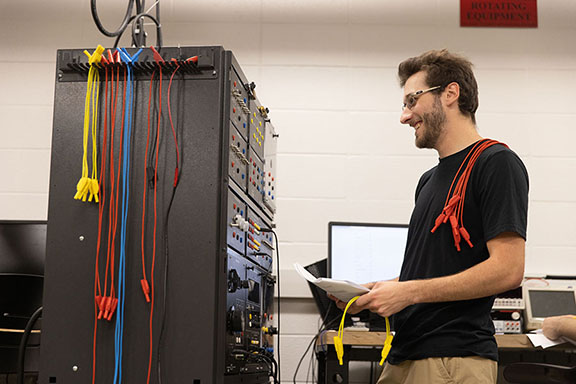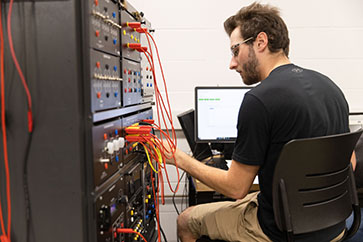
Bachelor's Degree in Cybersecurity
B.S.
Request Information
Cybersecurity Degree Program Overview
Purdue University Northwest’s (PNW) Bachelor of Science (B.S.) in Cybersecurity prepares you with the technical competency, knowledge and skills needed to protect networks, systems, software programs and data from criminal or unauthorized access. You will learn concepts, knowledge, skills, technologies and practices in a broad spectrum of cybersecurity areas, including the emerging fields of applied data science and artificial intelligence.
This program is hands-on and application-oriented. Upon the completion of the program, you’ll be ready to take highly sought-after industry certification exams.
Department of Computer Information Technology and Graphics
- The U.S. Department of Labor projects a 33% growth in cybersecurity occupations from 2020 to 2030.
- Cyberseek.org reports that half a million cybersecurity openings in the United States are unfilled.
- PNW has been designated a National Center of Academic Excellence in Cyber Defense (CAE-CD) by the U.S. Department of Homeland Security and the National Security Agency.
- Cybersecurity Guide has named PNW’s B.S. in Cybersecurity among its top 10 most affordable cybersecurity undergraduate programs for 2024.
- PNW College of Technology undergraduates saw a 94% placement rate in the 2023-24 Next Step Survey.
Program Educational Objective One
The program will produce graduates that comprehend the fundamentals of information technology, artificial intelligence and cybersecurity knowledge and skills.
Program Educational Objective Two
The program will produce graduates who are able to analyze system vulnerabilities, threats and risks and apply cybersecurity controls.
Program Educational Objective Three
The program will produce graduates who will be proficient in IT system design, artificial intelligence, security system design, penetration testing and investigation techniques and skills and apply them in system security analysis and evaluation.
Program Educational Objective Four
The program will produce graduates who are able to create information security plans to prevent, respond and mitigate security risk through the development and implementation of security policies, security controls and business continuity and disaster recovery plans.
Graduates of the Cybersecurity program will be able to (Program-Level Learning Outcomes):
- Analyze a complex computing problem and to apply principles of computing and other relevant disciplines to identify solutions.
- Design, implement, and evaluate a computing-based solution to meet a given set of computing requirements in the context of the program’s discipline.
- Communicate effectively in a variety of professional contexts.
- Recognize professional responsibilities and make informed judgments in computing practice based on legal and ethical principles.
- Function effectively as a member or leader of a team engaged in activities appropriate to the program’s discipline.
- Apply security principles and practices to maintain operations in the presence of risks and threats.
Enrollment Trends and Graduation Data
| Year | Enrollment | Graduates |
|---|---|---|
| 2022-23 | 56 | 1 |
| 2023-24 | 104 | 7 |
| 2024-25 | 160 | 11 |
| 2025-26 | 180 | - |
Cybersecurity Major Curriculum
You’ll take a balance of general education courses, College of Technology core courses and cybersecurity courses. This balance blends theory, applied research and experiential learning in all the vital aspects of IT, including networking, database administration, security and project management.
The cybersecurity program provides the specialized training you need for a career in this complex, in-demand field.
First-year courses cover the basics of IT in areas such as organization, history, related informing disciplines, application domains, computer math and other IT-related topics.
Sample Courses
- ITS 13500 – Operating Systems Technologies
- ITS 17000 – Networking Technologies
- ITS 24000 – Programming Fundamentals
Your second year covers in-depth discussions of networking, programming, database and fundamentals of information assurances.
Sample Courses
- ITS 25000 – Fundamentals of Information Assurance
- ITS 27000 – Internetworking Technologies
- ITS 37200 – System Administration and Management
Topics include administration, confidentiality, integrity, authentication, non-repudiation, intrusion detection, physical security, encryption and machine learning foundations.
Sample Courses
- ITS 35000 – Systems Assurance
- ITS 35200 – Disaster Recovery And Planning
- ITS 36500 – Machine Learning Foundations
In your final year, you’ll cover defensive programming techniques, bounds analysis, error handling, advanced testing techniques, detailed code auditing and software specification in a trusted assured environment.
Sample Courses
- ITS 45400 – Assured Systems Design And Implementation
- ITS 45800 – Advanced Topics in Cyber Forensics Practices
- ITS 47800 – Advances Topics in Cybersecurity Practices
Cybersecurity Degree Program Highlights
Cybersecurity workforce development is the key to assuring that the nation has adequate capacity to protect information and information systems.
This quickly growing field is both challenging and competitive. At PNW, we provide the tools you need to stand out, including US government-recognized curriculum and individualized attention from instructors.


Cybersecurity Degree Program Outcomes
Through classroom and lab interaction with experienced faculty, applied research and experiential learning, you’ll begin your professional work with the confidence and knowledge to be successful in a dynamic, competitive field.
Cybersecurity Degree Program Career Paths
This degree prepares you for a number of careers in the cybersecurity field, including:
- Cybersecurity specialist
- Cybersecurity penetration and vulnerability tester
- Cybercrime analyst and investigator
- IT auditor
- Network and system administrators
Cybersecurity Degree Program Employers
Our alumni work with some of the most innovative organizations across the region and around the world, including:
- Franciscan Health
- Amazon
- People’s Bank
- US Air Force
- National Security Agency (NSA)
Beyond the Cybersecurity Classroom
We encourage you to get involved in activities like:
- Information and Analytics Club
- ROAR Cyber Club
Cybersecurity Degree Program Scholarships
In addition to the scholarships available to all PNW applicants, students seeking a bachelor’s degree in cybersecurity may also be considered for program-specific scholarship awards, such as:
Meet the Faculty

Earn a Bachelor's Degree in Cybersecurity at PNW
Purdue University Northwest’s Cybersecurity degree enables you to reach a genuine understanding of all aspects of the industry while building a solid foundation in technology through hands-on experiences.
To see how a Bachelor’s Degree in cybersecurity from PNW opens doors, from corporate boardrooms to non-profit leadership, take the next step today!














